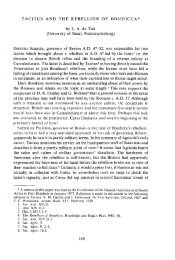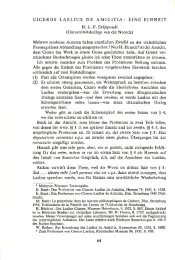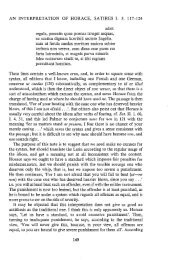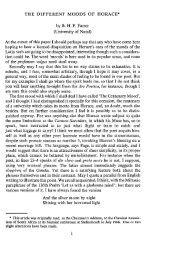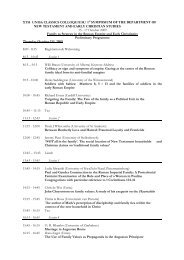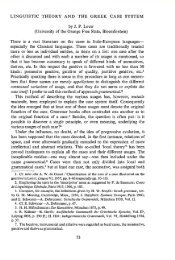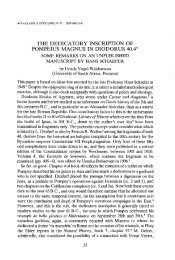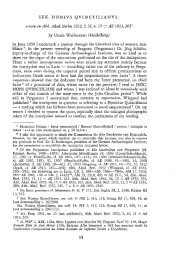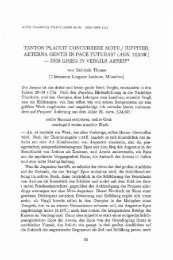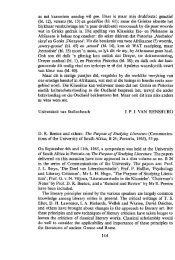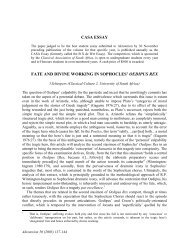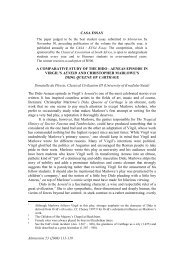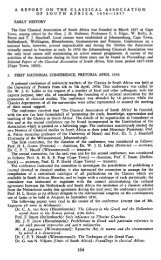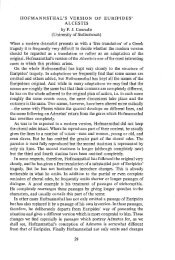THE PSYCHOLOGY IN ARISTOTLE'S LOST DIALOGUE EUDEMUS ...
THE PSYCHOLOGY IN ARISTOTLE'S LOST DIALOGUE EUDEMUS ...
THE PSYCHOLOGY IN ARISTOTLE'S LOST DIALOGUE EUDEMUS ...
Create successful ePaper yourself
Turn your PDF publications into a flip-book with our unique Google optimized e-Paper software.
It appears from Philoponus' comments that in the Eudemus Aristotle madetwo major objections to the thesis that the soul is nothing more than theattunement of the physical body. The first objection runs as follows: whileattunement has obviously a contrary, the soul has no such contrary. 8Admittedly, this particular objection could possibly be defeated by thecounter-argument that to everything, including attunement, might be opposedits contrary. 9 The second objection is this: attunement of the physicalbody is its health, strength or beauty, but the soul is neither physical healthnor strength nor beauty. 10In the De Anima 407 b 30-408 a 18, Aristotle enumerates four objectionsto the thesis that the soul is 'a kind of attunement', that attunement is ablending or composition of opposites, and that the body is made up ofcontraries. Aristotle's third objection reads as follows: 'It would be moreappropriate to call health (or generally one of the good states of the body)an attunement than to assert this about the soul.' 11 According to the testimonyof Philoponus, this is but a restatement of the second objection madeby Aristotle in the Eudemus, 12 where the Stagirite apparently added thefurther remark that 'health is an attunement' and 'the contrary of disease' . 13Commenting on Aristotle, De Anima 407 b 30-408 a 18, Simpliciusreports that 'by the arguments used in public discussions Aristotle meansthose of the arguments' which are adapted to the intelligence of mostpeople, hinting perhaps at those made in the Platonic Phaedo, but meaningalso those used by himself in the dialogue Eudemus in order to refute thecannot pre-exist its component elements; (2) the body is subordinate to the soul whichcontrols or guides the body, but attunement does not control or guide, but rather followsits component elements; (3) attunement admits of a 'more' and 'less', but the soul cannothave a 'more' or 'less'; ( 4) the soul can be good and evil, something which in the caseof attunement becomes either attunement or non-attunement, but it cannot be said that"attunement in itself is both attunement and non-attunement; and (5) if the soul is identicalwith attunement, and if virtue and vice are but different degrees of attunement, the soulcannot admit of virtue and vice because it cannot admit of different degrees.8. Philoponus, op. cit. p. 144, lines 24-25.9. Ibid, p. 144, lines 25-30.-W. Jaeger, Aristotle: Fundamentals of the History ofhis Development (Oxford, 1948), p. 45, believes that this particular 'rebuttal' or counterargumentis by Alexander of Aphrodisias rather than by Aristotle.10. Philoponus, op. cit. p. 144, lines 30-37.11. Aristotle, De Anima 408 a 1-3.12. Philoponus, op. cit. p. 147, lines 6-7.13. Ibid. p. 147, lines 7-9.-The other three arguments against the thesis that the soulis attunement-arguments or objections advanced in Aristotle, De Anima 407 b 30-408 a18, but apparently not contained in the Eudemus-are the following: (1) attunement isa certain proportion or harmony of the constituents (or components) thus blended, butthe soul is neither of these (to wit, proportion or harmony); (2) the power of originatingmovement cannot belong to attunement; and (3) the soul is neither the attunement(or harmony) of the several component parts of the body nor the ratio of these severalelements.AC P/ 451
theory that the soul is attunement (or harmony)'.l 4 In short, Simpliciusclaims outright 1. that in the Eudemus Aristotle objects to the theory thatthe soul is attunement; 2. that in the De Anima Aristotle takes up againthese objections; 3. that in his refutations Aristotle also took account of thearguments made in Plato's Phaedo; and 4. that these refutations, or someof them, were part of public discussions, or became the topic of some ofhis 'exoteric' writings.Themistius relates that 'another opinion about the soul has been handeddown . . . and has been examined both in public and private discussions.Some maintain that the soul is attunement. For attunement is a mixture andcombination of contraries, and the body is composed of contraries, so thatthat which brings these contraries into concord and harmonizes them ... isnothing other than the soul, just as the attunement of (different) notes blendslow notes with high notes. This argument is plausible, but it has beenrefuted in many instances both by Aristotle and Plato. The soul, these twomen insist, is prior to the body, but attunement (or harmony) is posterior;the soul rules and oversees the body and frequently antagonizes it, butattunement (or harmony) does not antagonize the things that have beenharmonized; attunement (or harmony) admits of a 'more' and of a 'less',but the soul does not; attunement (or harmony), so long as it is preserved,does not admit non-attunement or disharmony, but the soul admits wickedness;if non-attunement or disharmony of the body is illness, ugliness, orweakness, the attunement or harmony of the body must be beauty, healthand strength, but never the soul. All these things have been said by thephilosophers (sci/., Plato and Aristotle) elsewhere, but what Aristotle saysnow is that ... it is clear from what Aristotle has said here (sci/., in theDe Anima) and from what he has said elsewhere (sci/., in the Eudemus) thatthose people who maintain that the soul is attunement (or harmony) seemto be neither very near nor very far from the truth'. 15Themistius, it will be noted, fails expressly to mention the Eudemus,referring only in a general manner to what Aristotle says in the De Animaas well as 'elsewhere'. When commenting on the thesis that the soul is 'akind of attunement (or harmony)', Themistius merely restates or, perhaps,paraphrases Aristotle's arguments in the De Anima. Moreover, he briefly14. Simplicius, op. cit. supra note 3, p. 53, lines 1-4.15. Themistius, op. cit. supra note 4, p. 24, line 13-p. 25, line 25.-lt will be notedthat, like Philoponus and Simplicius, Themistius refers to 'public (or private) discussions'.This could mean also the so-called 'exoteric' works of Aristotle. See Philoponus, op. cit.supra note 2, p. 145, lines 21 ff.: 'When Aristotle maintains that he said this in his 'public'discussions", he must refer either to his unwritten discussions with his associates or tothe exoteric writings (among which are the dialogues, e.g. the Eudemus), which arecalled "exoteric" because they were not written for his true and intimate disciples, butfor the general advantage of the many . . . ' But unlike Philoponus and Simplicius,Themistius does not mention specifically the Eudemus.52
ecites the five arguments against this thesis, four of which are actually theobjections made by Plato in the Phaedo. The fifth argument listed byThemistius is actually the second objection of the Eudemus: "If nonattunement(or disharmony) of the body is illness, ugliness, or weakness,attunement (or harmony) of the body must be beauty, health and strength(8Uva1w;, not icrxu~), but never the soul' . 16 Themistius, on the other hand,does not record the first objection of the Eudemus, namely, that 'attunement(harmony) has a contrary, that is, the lack of attunement (non-attunement,disharmony), but the soul has no contniry' .17The differences between the comments of Themistius and those of Philoponusraise some interesting problems. It is not entirely impossible thatThemistius, whose account is certainly more succinct and probably lessaccurate than that of Philoponus, derived his information from Alexanderof Aphrodisias rather than directly from Aristotle's original text. This,however, is by no means certain. The specific tradition on which Themistiusrelies did not in all likelihood report the first objection made by Aristotlein the Eudeinus, to wit, that 'the soul has no contrary'. Neither does Themistiusrefer to the 'rebuttal' or 'counter-argument' found in the commentaryof Philoponus to the effect that 'one might object to this argument (thatthe soul has no contrary) that there is strictly no contrary to attunement(or harmony), but rather an indefinite privation. And the soul, being a form,has an indefinite opposite'. 18 These textual differences suggest not only thatPhiloponus relied on a different tradition than did Themistius-thatPhiloponus probably consulted the Eudemus-but also that the AristotelianEudemus apparently contained this 'rebuttal' or 'counter-argument'. Hence,this 'rebuttal' might not be a later interpolation of some commentator (assome scholars have suggested), but rather constitutes an orginal thoughtexpressed by Aristotle in the Eudemus. It is also interesting to observe thatthe first argument of the Eudemus has not been restated in Aristotle's DeAnima, while the second argument of the Eudemus, broadly speaking, istaken up again in the De Anima. 19Olympiodorus relates that 'in the Eudemus Aristotle makes the followingobjection: "Disharmony (non-attunement) is contrary to harmony (attunement),but since the soul is a substance (oucria yap), it has no contrary".This conclusion is obvious. Moreover, if the disharmony of the elements inan animal is disease, the harmony must be health, but not the soul ... The16. Themistius, op. cit. p. 24, lines 25-26. See Philoponus, op. cit. p. 144, lines 30-37,andibid.p.147,lines6-10.17. See Philoponus. op. cit. p. 144, lines 24-25. It should also be noted that Themistiuscombines into one single objection what Philoponus considers two separate objections,namely, objections four and five.18. Philoponus, op. cit. p. 144, lines 25 ff.19. Aristotle, De Anima 408 a 1-3.-It will be observed that Themistius uses the termliUvaJ.uc;, where Philoponus refers to tcrxuc;. See note 16, supra.53
third argument (in Aristotle's De Anima) is the same as the second argumentin the Eudemus'. 20 The only new information conveyed by Olympiodorus isthe important statement that the soul 'is a substance' or, better, that in theEudemus Aristotle might have called the soul a substance. Presumably, thisstatement was part of the first objection or argument contained in theEudemus. But we cannot escape the impression that Olympiodorus' (orAristotle's?) argumentation contains a petitio principii in that it simplypresupposes the substantiality of the soul, which it is supposed to prove inorder to disprove the contention that the soul is merely attunement orharmony. 21Sophonias maintains that 'there has been handed down yet anotheropinion about the soul, which many people find plausible, as much as anyof those opinions that have been recorded. This opinion, however, hasalready been dealt with and refuted by appropriate arguments which havebeen published-both by our arguments directed at Eudemus and by thosecontained in Plato's Phaedo. Nevertheless, these arguments will be criticizednow as well. Some say that the soul is attunement (or harmony).' 22 Obviously,Sophonias refers here to the objections to the thesis that 'the soul isattunement or harmony'-objections which had been listed in Plato'sPhaedo, Aristotle's De Anima and Aristotle's Eudemus.It should be borne in mind, however, that any interpretation of the severalfragments attributed to the Eudemus must always take into account thedoctrinal foundation as well as the didactic range of the Platonic Phaedo.In the Phaedo Plato tackles, from a variety of approaches, the many problemsconnected with the soul: the soul constitutes the principle of life; itis the substance or being which can be held responsible for its own perfectionor imperfection; and it may be called the 'locus of knowledge' of theIdeas. Sometimes Plato speaks-in a manner reminiscent of an 'exhortationto philosophy'-of the value or meaning inherent in a rational knowledgeof things eternal, and of the means ofachieving such knowledge. The dramaticsetting of the Phaedo undoubtedly elevates this dialogue to a deeplymoving consolatio mortis. All this raises the complex problem of whether,and to what extent, Aristotle in his Eudemus simply imitated the Phaedowhetherthe Eudemus touches on the vast range of issues similar to those ofthe Platonic Phaedo. 23 It must also be noted that by the year 353/52, the20. Olympiodorus, op. cit. supra note 5, p. 173, lines 20-30.21. See J. Bernays, Die Dialoge des Aristoteles in ihrem Verhiiltnis zu seinen iibrigenWerken (Berlin, 1863), p. 145, note 15.-This petitio principii goes back to Plato's Phaedo.Philoponus, however, seems to avoid this petitio principii. Here the argument, at leastby implication, proceeds from the absence of contraries to the fact that the soul is asubstance. J. Bernays, toe. cit. See also W. Jaeger, op. cit. supra note 9, p. 44.22. Sophonias, op. cit. supra note 6, p. 25, lines 4-8.23. See 0. Gigon, 'Prolegomena to an Edition of the Eudemus', Aristotle and Platoin the Mid-Fourth Century (Goteborg, 1960), p. 30. Ibid. p. 31 ff., Gigon suggests that54
year in which Aristotle wrote the Eudemus, it was not very likely thatAristotle should be content with merely composing an imitation or, perhaps,a revised version of the Platonic Phaedo; or that he should discuss thequestion of whether the soul is attunement (or harmony) in exactly thesame dialectical context as Plato had done some thirty years before. 24When discussing in detail the two objections (or proofs) of the Eudemus,(namely, that the soul is not merely attunement or harmony or the body;and that the soul is not the health, strength or beauty of the body,) W.Jaeger insists that the very nature of the Eudemus-the fact that it is reallya consolatio mortis-furnishes the starting point for a theoretic-speculativediscussion of the immortality of the soul. 25 In a spirit reminiscent of the'other-world-directed' eschatology so eloquently expounded in the PlatonicPhaedo, Aristotle attacks, in the Eudemus, any and every position that isopposed to-or may threaten-the doctrine of the immortality of the soul.Aristotle's arguments, it will be noted, are essentially identical with thoseadvanced in the Phaedo. Aristotle's basic premise cannot possibly admitthat the soul is merely the attunement·or harmony of the bodily elementsthatthe soul, while certainly different from the body, is merely the harmoniousarrangement (or the product of the proper arrangement) of thebodily elements. T9 refute the allegation that the soul is only 'attunement',Aristotle uses two main arguments, of which the first one reads as follows:'Attunement has a contrary-non-attunement-but the soul has no contrary.Hence, the soul cannot possibly be attunement'. In short, the non-identityof attunement and soul is demonstrated with the help of the non-identityof their respective 'characteristics' or contraries. This, in turn, implies thatAristotle grounds the identity of two objects on the identity of their respectiveattributes or contraries. This is, at least by implication, the line ofargumentation which Aristotle uses in the Categories: 'Another characteristicof a substance is that it has no contraries'. 26 Moreover, Aristotle'sargumentation in the Eudemus is presented in the form of a syllogism. Thissyllogism, however, does not merely demonstrate that the soul is not, andmany more fragments of the Eudemus might possibly be retrieved from Hellenistic,Patristic and Alexandrian literature.24. 0. Gigon, op. cit. p. 21, and ibid. p. 29. Gigon, ibid. p. 30, also points out thatthe Platonic Plzaedo differs from the Eudemus in that the former discusses the problem ofimmortality from the viewpoint of a man about to die (Socrates), while the latter discussesimmortality from the standpoint of someone who grieves over the death of a recentlydeceased friend.25. W. Jaeger, op. cit. supra note 9, pp. 40 ff.26. Aristotle, Categories 3 b 24.-W. Jaeger denies that the Categories are an authenticwork of Aristotle. See, however, K. von Fritz, 'Der Ursprung der AristotelischenKategorienlehre', Archiv fiir Geschichte der Philosophie, vol. 40 (1931), pp. 439-496.Von Fritz believes that the greater part of the Categories is authentic. Ibid. pp. 450-451,note.55
cannot be, identical with attunement, but it also proves, at least by implication,that the soul is a substance. 27It will also be remembered that in the Phaedo Plato had pointed out thatattunement or harmony is an attribute of the soul, but never the soul itself. 28Here Plato's argument is based on a logical argument which in a moreabstract form is restated by Aristotle in the Categories: 'One particularsubstance ... cannot be "more or less" ... The same quality is said tosubsist in a thing in varying degrees . . . But a substance is not said to be"more or less" that which it is . . . Substance, then, does not admit ofvariation of degree.' 29 Hence, if the soul, indeed, is a substance, there27. See also W. Jaeger, op. cit., pp. 40-41.-K. von Fritz, op. cit. supra note 26, pp .473-474, argues as follows: the Eudemus contains the argument that since harmony hasa contrary, namely, disharmony, the soul cannot be harmony because it has no contrary.This argument implies that the soul must be a substance, because a substance has nocontrary. The fuller significance of this statement, according to Jaeger, becomes fully clearonly when related to the Categories of Aristotle(?), which demonstrates that categorieshave no contraries. But the reasoning in the Eudemus, Von Fritz insists, does not necessarilypresuppose that at the time Aristotle composed the Eudemus, that is, about 353/352B.C., he had already developed the basic principles of his doctrine of categories. Withoutdoubt, prior to the final development of his integrated doctrine of categories, as it canbe found in the Categories, Aristotle did operate with certain isolated categories such assubstance (which might have been discussed in the Academy and, it appears, in theAristotelian On Ideas, commonly dated between 357 and 355 B.C.). But Aristotle did so ina context in which these isolated categories were not yet integrated into a system ordoctrine of categories.28. Plato, Phaedo 92 BD: 'My Theban friend [Simmias], you will have to think differentlyif you will maintain that harmony is a compound, and that the soul is a harmonywhich is made out of strings set in the frame of the body. For you will surely never allowyourself to say that a harmony is prior to the elements which make up that harmony .. .But do you not see that this is what you imply when you say that the soul existed beforeshe took the form and body of man, and was composed of elements which as yet had noexistence? For harmony is not like the soul, as you suppose. First the lyre, and the strings,and the sounds exists in a state of discord, and then harmony is produced last of all, andis the first to perish. And how can such a notion of the soul as this agree with the other? . . .And yet ... there surely ought to be harmony in a discourse of which harmony is thetheme . .. But there is no harmony .. . in the two propositions that knowledge is recollection,and that the soul is harmony. Which of them will you retain? I think, he replied,that I have a much stronger faith ... in the first of the two, which has been fully demonstratedto me, than in the latter, which has not been demonstrated at all, but rests onlyon probability and plausible grounds and, therefore, is believed by the many. I knowonly too well that these arguments from mere probabilities are imposters, and unlessmuch caution is used in the use of them, they are apt to be deceptive . .. But the doctrineof knowledge and recollection has been proven to me on trustworthy grounds. This proofwas that the soul must have existed before she came into the body, because to her belongsthe essence of which the very name implies existence. Having, as I am convinced, rightlyaccepted this conclusion, and on sufficient grounds, I must, as I suppose, cease to argue,or allow others to argue, that the soul is harmony.'29. Aristotle, Categories 3 b 33-4 a 9.56
cannot be different degrees of soul. Neither can the soul have contraries. 30Aristotle's second argument runs as follows: 'The opposite of attunement(or harmony) of the body is non-attunement (disharmony) ofthe body. Butthis non-attunement (disharmony) of the living body is disease, weaknessand ugliness ... If, then, non-attunement (disharmony) is disease, weakness,and ugliness, attunement (harmony) is health, strength and beauty . . .Hence, the soul is not attunement (harmony).' 31 As is commonly known,Plato frequently speaks of the virtues of the soul (wisdom, fortitude,temperance, and justice) as well as of the virtues of the body (health,strength, and beauty). 32 Each of these sets of virtues has a set of opposites,namely, the vices of the soul (lack of wisdom, cowardice, intemperance,and injustice) as well as of the body. With Plato the virtues ultimatelydepend on a state of harmony (or symmetry), the vices on the disharmony(or lack of symmetry) within either the soul or the body. 33Closer analysis of Aristotle's two arguments against any identification ofthe soul with attunement, harmony or symmetry should make it amplyclear that Aristotle's earliest psychology, as he expounded it in the Eudemus,is to a large extent grounded in Platonic metaphysics. Although technicallydifferently formulated, these arguments, or rather, these proofs for theimmortality of the soul are largely dependent on Plato's doctrine of theimmortality of the soul. They are influenced by Plato's conception ofsubstance as well as by Plato's conception of the soul. 34 It will not bedisputed, however, that the assertion, 'attunement (harmony) has a con-30. Ibid. 6 b 15 ff.: 'It is possible for relatives to have contraries. Thus virtue has acontrary, namely, vice, both of which are relatives ... It also appears that relatives canadmit of variation of degrees .. .' See also W. Jaeger, op. cit. supra note 9, pp. 41-42.Jaeger insists that in the Phaedo Plato infers the non-identity of soul and attunement (orharmony) from the impossibility of applying one and the same logical principle to bothconceptions. Plato insists that a 'more or less' variation of degree can take place onlyin the 'indeterminate', but never in anything absolutely determined. The proposition,advanced in thePhaedo, that a substance does not admit a 'more or less', is related in theEudemus to the prior proposition on which the first proposition depends, namely, to theinsistence that a substance admits no contraries or opposites. See W. Jaeger, foe. cit.31. Philoponus, op. cit. supra note 2, p. 144, lines 30-37.32. See, for instance, Plato, Republic 591B; Plato, Plzilebus 25D ff.; Plato Laws 631C;etpassim.33. See, for instance, Plato, Republic 444A ff.; and ibid. 609A ff.; Plato, Sophist 228Aff.; Plato, Statesman 296D; Plato, Laws 906D, and ibid. 653A ff.-See also W. Jaeger,op. cit. supra note 9, p. 43. Jaeger maintains that Plato borrowed from contemporarymedicine the definitions of disease, weakness, and ugliness as disharmony or lack ofsymmetry. By analogy, Plato's ethics, especially his notions of a 'therapy of the soul', isalso modelled on contemporary medicine, for which he had much admiration. Plato'sdoctrine of virtues and vices is in fact a doctrine of the health or illness of the soul. It hasas its underlying principle the concept of 'measure', harmony or symmetry. But if harmonyis the principle of bodily virtues, the soul cannot itself be the harmony of the body.34. W. Jaeger, op. cit. p. 44.57
trary, but the soul, being a substance, has no contrary', contains an overt,or at least, an implied petitio principii. This holds true not only as regardsAristotle's argumentation or proof in the Eudemus, but also as regardsPlato's reasoning or dialectics in the Phaedo, where we encounter the samedogmatic presupposition that the soul is an independent substance. 35A further analysis of the Eudemus, especially of Philoponus' Commentary,also indicates that Aristotle not only asserts the substantiality of the soul, butalso endows his conception of the soul with certain attributes or 'qualities'characteristic of Plato's Ideas. These characteristics or 'qualities' becomemanifest when the soul is being compared with the physical body. 36 Thisseems to follow from Philoponus' observation: 'One might object to thestatement that strictly speaking there is no contrary to attunement (orharmony), but rather an indefinite privation. And the soul, being a kind ofform (d06~ n), has an indefinite opposite ... (and) a certain kind ofprivation changes into soul'. 37 In other words, even the soul, if conceivedas a kind of form (d06~ n), has in a certain sense something like a contrary,namely, privation. This can mean but one thing: the soul, in so far as it isconceived as the 'form (doo~) of animation', that is, as the principle ofanimation which converts any body into a living body, can have a sort of'contrary', namely, the inanimate body. This does not preclude, however,that the soul, conceived as the 'Idea of animation', is a substance. 38 Anautonomous substance such as the soul can be both an independent substanceand the principle of animation of the living body. In this sense itmight also be called the 'form of a living body'-obviously a Platonic twist.In the De Anima Aristotle points out that 'we are in the habit of recognizingsubstance as one determinate kind of what is, and this in severalsenses, namely, in the sense of matter or that which in itself is not "a this";and, again, in the sense of form or essence, which is that precisely in virtueof which a thing is called "a this"; and, finally, in the sense of that which iscompounded of both matter and form. Now matter is potentiality, formactuality. Of the latter there are two degrees which are related to oneanother as, for instance, knowledge is related to the exercise of knowledge.Among substances are by general consensus reckoned bodies and, especially,natural bodies. For they are the principles of all other bodies. Of naturalbodies some have life in them, other not ... Every natural body whichhas life in it is a substance in the sense of a composite. But since it is alsoa body of such and such a kind, viz. having life, the body cannot be a soul.The body is the subject or matter, not what is attributed to it. Hence, thesoul must be a substance in the sense of the form of a natural body having35. See note 21, supra.36. This has been denied by Jaeger. See W. Jaeger, op. cit. pp. 39 ff.37. Phi1oponus, op. cit. supra note 2, p. 144, lines 25-30.38. See E. Berti, La Filosofia del Primo Aristotele (Padua 1962), p. 429.58
life potentially without the body.' 39Thus, Aristotle insists that the substantial nature of the soul is not incompatible,but essentially connected, with the fact that it is also a 'form'.It will be noted that Aristotle contends that substance is the 'act' or, better,the 'actualization'. Hence, he defines the soul as the act of a physical bodypotentially endowed with life. In other words, the soul, as substance, is notthe act of any physical body, but rather that of a living body, or at least,potentially living body. It is the actualization of a potentially living bodyor of a body which has the 'potency of living'-the principle or form byvirtue of which the body becomes a living body, that is, an animated body. 40This being so, the soul is inseparably connected with the living body, foras long as the body lives, it cannot be separated from the soul. Wheneverthe body ceases to live, the soul becomes separated from the body. Andsince the soul is a substance, it must live on and persist after this separation.In his Commentary to Aristotle's De Anima, Simplicius maintains: 'Platois in every case accustomed to call by the same name the forms and thecorporeal things which are formed according to these forms. Aristotle,however, when the thing thus formed is divisible, avoids using the sameterm, because of the great differences between the divisible corporeal thingand the indivisible form. The reasoning soul he describes not only as limited,but also as a limit. For as the soul is between the indivisible and divisible,being in a sense both, so too the soul is between the limit and the limited,exhibiting both characteristics-the latter as moving discursively, the.former because it always moves in obedien·ce to limits, and because all thathas been unfolded is gathered into one. In this respect it is likened to thelimiting reason. And because of this he says in his dialogue on the soulentitled Eudemus that the soul is a kind of form (Ei:l'ill n), and praises thosewho describe the soul as being receptive of forms-not the whole soul; butonly the rational soul, as knowing the forms that have the second degreeof truth. For it is to reason, which is greater than the soul, that the reallytrue forms correspond. ' 41These remarks are directed at the passages in the De Anima, whereAristotle discusses the rational or intellectual soul. 42 Aristotle insists that,'if thinking is like perceiving, thinking must be either a process in which thesoul is acted upon by what can be thought, or a process different thoughanalogous to that', then the rational soul is 'capable of receiving the form(EHi11) of an object. Hence it must be potentially identical in character withits object without being this object itself. For the mind must be related to39. Aristotle, De Anima 412 a 7-21.40. See also W. Jaeger, op. cit. p. 45.41. Simplicius, Comment. ill Arist. De Auima, CIAG, vol. 11 (edit. M. Hayduck, 1882),p. 221, lines 20-33.42. Aristotle, De Anima 429 a 10-29.59
what is thinkable .. .' 43 And 'since everything is potentially an object ofthought, the intellect ... must be free from all admixture. For the presenceof what is alien to the intellect's nature is a hindrance and an obstacle. Itfollows, therefore, that the intellect too, like the sensitive part (of the soul),can have no nature of its own other than that of having a certain potentiality.Hence, that in the soul which is called the intellect, is, before it thinks, notactually any real thing. For this reason it cannot reasonably be regardedas integrated with the body. For if it were integrated, it would acquire somequality of the body ... But as it is, it has none. It was a good idea to call thesoul the "domicile of forms", although this description holds true only forthe intellectual soul, and it holds the forms only potentially, not actually.' 44Simplicius' comments, it appears, point to the fact that in the De AnimaAristotle proclaims a certain affinity between the intellectual soul and the'forms' (st8T]). This 'certain affinity' seems to consist in the fact that theintellectual soul is 'receptive of the forms'. Aristotle, Simplicius continues,prefers to call the intellectual soul a 'certain kind of form' (d86~ n), andnot simply a form (st8TJ). It will be remembered that in the Phaedo Platorefers to the form and to whatever possesses this form as d8o~ (such as theIdea of the Good or the Good). Aristotle avoids this identification, probablybecause the Idea of the Good is indivisible, while something good is plainlydivisible. Since the rational or intellectual soul is capable of knowing all theforms (st8T]), at least potentially, Aristotle chooses to call the soul d8o~-aterm which is common to all pure forms in general. Or to put it differently:in the Eudemus the soul is not 'the form of something' (d8o~ nvo~). butrather a 'form of itself' (st86~ n)-an Idea or something of the nature of anIdea. 45 Hence, it may be concluded that Simplicius' reference to the soul asd86~ n is primarily an attempt to give expression to the fact that the soul issomething immaterial which is capable of intuitively grasping and, thus,of potentially possessing, the true forms (st8T])-the intelligible forms of allobjects of rational knowledge. 4643. Ibid. 429 a 13-17.44. Ibid. 429 a 17-29.45. See also W. Jaeger, op. cit. pp. 45-46.46. See also E. Berti, op. cit. supra note 38, pp. 432-434.-As to Aristotle's notion ofthe 'intuitive' or 'mystic' vision of the 'primary, simple, and immaterial object and thusgaining true contact with the pure truth', see Plutarch, De /side et Osiride (Moralia382DE), a passage which some scholars (J. Croissant, E. Bignone, 0. Gigon, W. D. Ross,and others) consider a fragment of the Eudemus. See frag. 10, Ross. Of no particularinterest are frags. 11 and 12, Ross. Frag. 11 contains a passage from Al-Kindi, cod.Taimuriyya, Falsafa 55, which relates the story of a Greek king, 'whose soul, being caughtup in ecstasy, for many days remained neither dead nor alive'. When the king regainedfull conscience, he related what he had seen in 'the other world', namely, 'souls, forms,and angels'. He also began to prophesy future events. 'Aristotle asserts that the explanationfor all this was that his soul had acquired this knowledge because it had been near theliving body and had in a certain way been separated from it, and so had seen what it had60
In conclusion, the following might tentatively be said about the doctrinalcontent of the Eudemus: the soul is a substance, though an immaterialsubstance; it lives on after the body has died; the soul's life after the body'sdeath is happier, more 'natural', and certainly far superior to its earthlysojourn; it probably existed before it became connected with the physicalbody; and it is the 'quickening' principle of the living body. All thesecharacteristics and functions of the soul, to which we should add that thesoul is an Idea and that it possesses recollection (anamnesis), are undoubtedlystrongly under the influence of Plato's Phaedo, although we may discernthat Aristotle does evince a certain independence of Plato on the subjectof the soul. All this suggests that the Eudemus is also a 'reminiscence' of thePlatonic Phaedo: both dialogues commemorate the death of a belovedperson. In itself this would lend support to the assumption that the Eudemusand the Phaedo are fairly similar in content as well as aim. Hence, it mightalso be maintained that the Eudemus is modelled on a Platonic dialoguecomposed about thirty years earlier. One might object here that theseintervening thirty years were a period of intensive re-thinking and rewriting,by Plato 47 and the other members of the Academy, of the many problemsdiscussed in the Phaedo. In this sense the Eudemus, which was composedabout 353/352 B.C., might also be styled a 'regression' to a philosophicposition held by Plato during the 'eighties. More than that, the Eudemusmight actually be called the literary expression of a sentiment which foundits natural and proper outlet in the reversion to a stage in the philosophicdevelopment of Plato that was already a thing of the past at the time theEudemus was composed. This older position, however, provided an emotionallysatisfying expression for the sentiments of an exalted consolatiomortis. 48 And the consolatio mortis in a way is never outdated.The observation of Olympiodorus that in the Eudemus Aristotle calls thesoul a substance, 49 has far-reaching consequences. In several passages whichare traditionally considered fragments or excerpts from the Aristotelian Onseen. How much greater marvels of the upper world of the kingdom would it have seen,then, if it had really left his body completely'. See also J. H . Waszink, 'Traces of Aristotle'sLost Dialogues in Tertullian', Vigiliae Christianae, vol. 1 (1947), pp. 137-149. Frag. 11,Ross, has also been credited to Aristotle's lost dialogue On Philosophy because of itsaffinity to Sextus Empiricus, Adversus Physicos I. 20-23; frag. 10, Rose; frag. 12a,Walzer; frag. 12a, Ross.47. The remaining fragments of the Eudemus apparently do not indicate any influenceof the philosophic standards or philosophic psychology advocated in book IX of Plato'sRepublic or in the Platonic Plzilebus.48. See here D. A. Rees, 'Theories of the Soul in the Early Aristotle', Aristotle and Platoin the Mid-Fourth Century (Goteborg, 1960), pp. 191 ff. For additional and interestingcomments, see also 0 . Gigon, 'Prolegomena to an Edition of the Eudemus', ibid. pp. 19-31.49. See notes 5 and 20, supra.61
Philosophy, 5 ° Cicero relates that according to Aristotle the soul has a nature(or substance) radically different from that of the four traditional (material)elements; and that it possesses a "non-material" (spiritual?) nature whichis similar to, if not identical with, the nature of the divine. Assuming thatCicero accurately reports views held by Aristotle-and there exists no validreason why we should doubt him-then at one time of his philosophicdevelopment Aristotle advocated the 'non-material' (spiritual?) nature ofthe human soul; the substantiality of this soul; the individuality of this selfsamesoul; the personal immortality of the soul; the independence of thesoul from the material world; and the co-substantiality (or connaturality)of the human soul with the divine. Although these particular fragments orexcerpts from Cicero have conventionally been assigned to Aristotle's OnPhilosophy, it is quite likely that they refer to the Eudemus. 51 Such a reassignment,like any detailed discussion of the doctrinal content of theseCiceronian fragments, however requires a separate and lengthy treatmentand, hence, are really outside the limited scope of this paper. 5 250. Cicero, Academica I. 7. 26; Cicero Tusculanae Disputationes I. 10. 22; ibid., I. 17.41;ibid., I. 26. 25-27. 66; frag. 27, Walzer; frag. 27, Ross; frag. 30, Untersteiner.51. This is the opinion ofO. Gigon. See 0. Gigon, op. cit. supranote48.52. The present author is about to complete an investigation of these Ciceronianpassages, which will appear in The New Scholasticism in the near future.62



